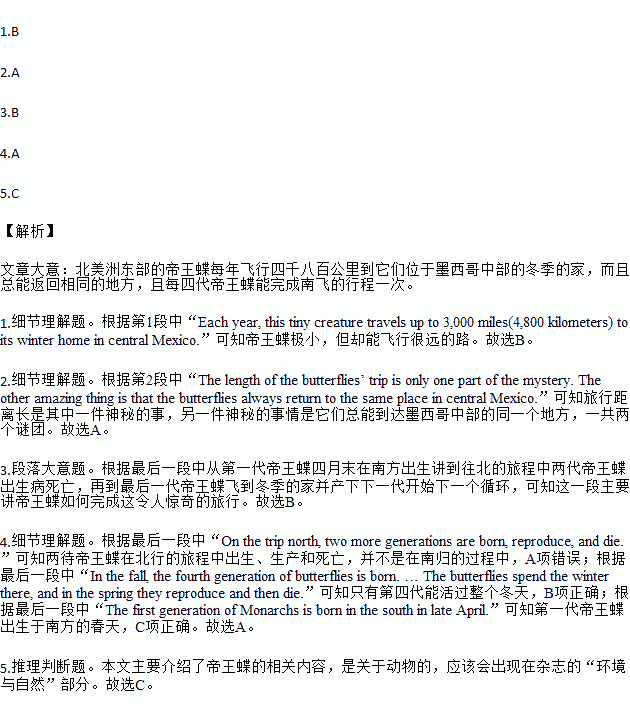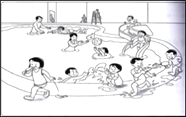题目内容

Monarch butterflies(帝王蝶) from the eastern part of North America make the most amazing journey in the insect world. Each year, this tiny creature(生物) travels up to 3,000 miles(4,800 kilometers) to its winter home in central Mexico(墨西哥). How can it fly so far? And what is the purpose of its long and dangerous trip? Scientists still don’t have an explanation.
The length of the butterflies’ trip is only one part of the mystery. The other amazing thing is that the butterflies always return to the same place in central Mexico. How do the butterflies find their way back to the same place? This is an interesting question because only every fourth generation(代) makes the trip south. In other words, the butterfly that travels to Mexico this year is the great-great-grandchild of the butterfly that traveled there last year.
Each year, four generations of a Monarch butterfly family are born. Each generation of the family has a very different life. The first generation of Monarchs is born in the south in late April. It slowly moves north, reproduces, and then dies. On the trip north, two more generations are born, reproduce, and die. Each of these generations of butterflies lives for only two to five weeks. In the fall, the fourth generation of butterflies is born. Compared to its parents, this generation has a long life. It lives for about eight months. This generation of butterflies makes the amazing journey to the winter home of its great-great-grandparents. The butterflies spend the winter there, and in the spring they reproduce and then die. Their children will be the first generation of the next circle. How amazing it is!
1.From the passage we know that monarch butterflies ________.
A.spend their winter in North America
B.are small but can fly quite a long way
C.travel to central Mexico to reproduce
2.There are ________ mysteries about monarch butterflies’ journey.
A.two B.three C.four
3.The last paragraph is mainly about ________.
A.why Monarch butterflies fly from north to south
B.how Monarch butterflies make the amazing trip
C.when each generation of butterflies reproduce
4.According to the article, which of the following is NOT TRUE?
A.Two of the generations are born on the trip back to south.
B.Only the fourth generation can live through the whole winter.
C.The first generation of Monarchs is born in the south in spring.
5.We can read this passage on the ________ part of a magazine.
A.sports and health B.science and technology C.environment and nature
 黄冈海淀全程培优测试卷系列答案
黄冈海淀全程培优测试卷系列答案All of us want to be healthy. To keep healthy, more and more people are doing sports. Do you like sports? If yes, which is your favorite sport? Look at the ads(广告), they may help you.
Nancy’s Gym Lose weight! $25/ hour Opening time: Saturday and Sunday Tel: 455-6223 |
Ice World Have fun skating here! $ 20/ hour for children $ 30/ hour for adults(成年人) Tel: 886-8252 |
Water World Opening time: 9:00 a.m. ~9:00 p.m. every day Adults: $ 10 Children(aged 15 and under): $ 7 Tel: 215-1829 Come to Water World! Two pools for children Two large pools for adults Two restaurants |
1.What do people in Nancy’s Gym want to do?
A.To enjoy swimming. B.To learn to skate.
C.To lose weight. D.To eat delicious food.
2.If Mr. Smith goes skating with his child, they need to pay ________ for two hours’ skating.
A.$ 50 B.$ 60
C.$ 80 D.$ 100
3.People can go to Water World at ________.
A.8:00 a.m. B.1:30 p.m.
C.9:30 p.m. D.10:00 p.m.
4.You can call ________ if you want to swim.
A.215-1829 B.886-8252
C.215-1982 D.455-6223
5.Which of the following is TRUE?
A.Ice World is only for adults. B.People can go to Nancy’s Gym on Sunday.
C.There are four large pools in Water World. D.Children needn’t pay to go swimming in water World.




